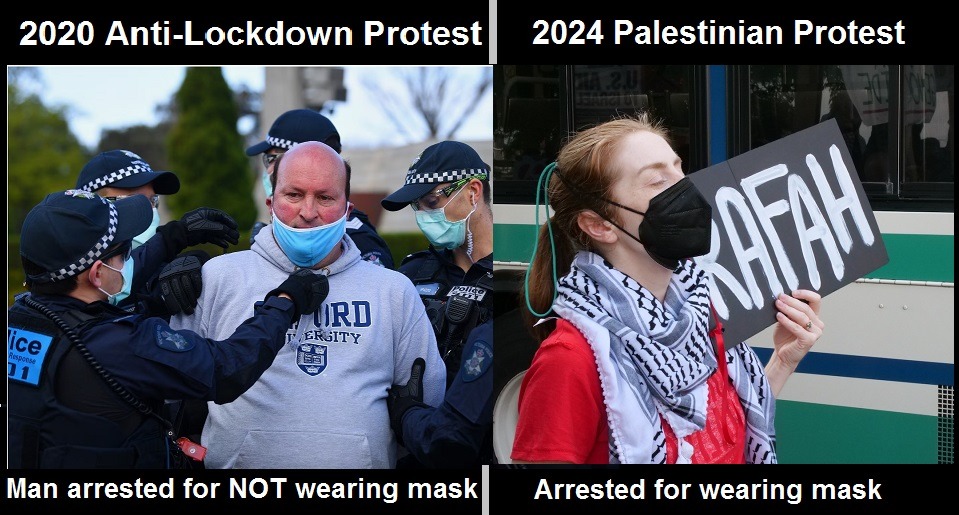You’re Still Exempt. Just Say “I Am Unable to Wear a Face Mask Safely.” Nothing More.
by Allan Stevo, Lew Rockwell:

Many millions cannot safely wear a face mask. With the one-size-fits-all face mask approaches, this presents a problem.
Those who can’t safely wear a face mask are pressured into wearing one, to their own detriment, or they are alternately, discouraged from using vital services due to the heavy-handed enforcement measures that place personal safety secondary at best.
The reasons for not being able to safely wear a face mask are many: from obvious issues such as chronic lung ailments and terminal heart conditions, to less obvious issues like panic attacks, dyspnea (shortness of breath), angina (chest pains), cephalalgia (headaches), migraines, internal physical deformations from injuries, or genetic abnormalities.
Since my previous writing on the topic, in addition to my own experience, I have received many correspondences from people crossing face mask compliance checkpoints and sharing what works and doesn’t work for them. There are some behaviors that work repeatedly across the board and there are some behaviors that don’t work. Using some of these principles, I have yet to wear a face mask even one time.
One sentence is supremely helpful. You almost never need anything else, even in the most locked down environments: “I am unable to wear a face mask safely.”
I’m going to elaborate more on why that is such an effective sentence, and the only sentence you need at a compliance checkpoint.
The Risk Of Putting A Person In A Situation Where They Practically Have To Say “No” Is That They Say “No”
While those millions who cannot safely wear a face mask also have legitimate sovereignty concerns, constitutional concerns, natural rights concerns, legal concerns, and perhaps many other concerns, there are very few Americans policing face mask policy who will effectively quit their job for the benefit of another by saying “I totally agree with you, no one should have to wear a face mask, I’m going to look the other way knowing that I may be one of the unemployed 30% of Americans ten minutes from now by honoring your personal sovereignty.”
That would be purely irresponsible of that person checking for compliance, and you would be expecting far too much of them. You’d probably be expecting more from them than you might expect from yourself, which isn’t fair. That’s hypocrisy, in fact. You can, perhaps, imagine how ineffective it therefore is, to make such an argument at a compliance checkpoint. It’s simply not the right venue.
The compliance checker may even have been trained to involve a supervisor anytime anyone makes such a natural rights claim and to have you added to a blacklist. To violate that instruction could again come at the cost of them losing their job. Great effort, after all, is made by management consultants and behavioral psychologists to create policies that remove the humanity from a human and to make him more like a machine while on the job.
Going the natural rights route is particularly dangerous because it is an axiomatic battle. It requires the compliance checker to believe the same hard-won axioms as you. If they believe in anything, they are far more likely to accept the commonplace “for the greater good,” combined with the anti-sciencey rhetoric of mask enforcement and fear that floods the airwaves.
The places where you are most likely to find strict face mask enforcement are the places where you are least likely to happen upon someone who share those axioms: coastal locations, big cities, airports, and a host of other hubs. You might end up with a memorable conversation, but in those places you aren’t likely to get yourself through the door unmasked with that kind of approach.
While I have no cross-sectional data, I would also presume that those who self-select for jobs at compliance checkpoints are less likely to be sympathetic to natural rights.
The odds are against you with this argument in this venue.
Honor Your Own Privacy By Not Talking Specifics About Your Own Health & Well-Being With Strangers
Other people who cannot safely wear a face mask, may have a face mask exemption for a medical reason that they are exceedingly comfortable talking with strangers about. A problem in that situation is that a stranger may not agree with you about the severity of your medical problem and its impact on you wearing a face mask. This is not a discussion to have with a stranger.



